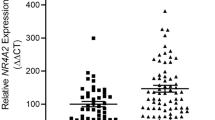Abstract
Objective
In placental vascular disease identified by umbilical artery Doppler study we have shown the existence of a factor in fetal plasma that causes activation of endothelial cells in culture with expression of cell adhesion molecules and nitric oxide synthase, apoptosis, and proinflammatory cytokine production. The present work was carried out to investigate a maternal origin for this factor active in the fetal circulation.
Methods
We collected maternal plasma from pregnant women with Doppler-defined umbilical placental vascular disease and examined its effect on endothelial cells in culture. Aliquotsfrom a common culture of human umbilical vein endothelial cells (HUVEC) were incubated with maternal plasma from women with normal pregnancy (n = 23), umbilical placental vascular disease defined by abnormal umbilical artery Doppler (n = 30, with or without preeclampsia), and preeclampsia with normal umbilical artery Doppler (n = 14). The expression of mRNA for inducible and endothelial constitutive nitric oxide synthase (iNOS and ecNOS, respectively) was assessed by reverse transcriptase polymerase chain reaction.
Results
There was no significant increase in either the iNOS or the ecNOS mRNA expression by HUVEC cultured with maternal plasma from pregnancies with umbilical placental vascular disease compared with normal pregnancy (iNOS 1.49 ± 0.35 versus 1.38 ± 0.25; ecNOS 1.51 ± 0.35 versus 1.25 ± 0.27; P >.05). In the placental vascular disease group the results were similar for the presence or absence of maternal preeclampsia. In the samples from women with preeclampsia with normal umbilical Doppler, both iNOS and ecNOS mRNA expression (iNOS 1.42 ± 0.53; ecNOS 1.46 ± 0.39; P >.05) did not differ from normal.
Conclusion
Maternal plasma from pregnancies with umbilical placental vascular disease did not affect endothelial cell expression of nitric oxide synthase. This finding does not support a maternal origin for the factor demonstrated in fetal plasma. These results suggest separate pathogenic pathways for the endothelial cell activation seen in preeclampsia and fetal growth restriction associated with abnormal umbilical artery Doppler flow velocity waveforms. These findings are also consistent with the concept that the vascular pathology in the fetal placenta may be primary and that the uteroplacental circulation is reduced in response rather than acts as a constraint, (J Soc Gynecol Investig 2004;11:149-53)
Similar content being viewed by others
References
Roberts JM. Endothelial dysfunction in preeclampsia. Semin Reprod Endocrinol 1998;16:5–15.
Giles WB, Trudinger BJ, Baird PJ. Fetal umbilical artery flow velocity waveforms and placental resistance: Pathological correlation. Br J Obstet Gynaecol 1985;92:31–8.
Trudinger B, Song J, Wu Z, Wang J. Placental insufficiency is characterised by platelet activation in the fetus. Obstet Gynecol 2003;101:975–981.
Wang X, Athayde N, Trudinger B. Endothelial cell expression of cell adhesion molecules is stimulated by fetal plasma from pregnancy with umbilical placental vascular disease. Br J Obstet Gynecol 2002;109:770–7.
Wang X, Wang J, Trudinger B. Gene expression of nitric oxide synthase by human umbilical vein endothelial cells: The effect of fetal plasma from pregnancy with umbilical placental vascular disease. Br J Obstet Gynecol 2003;110:53–8.
Wang X, Yi S, Athayde N, Trudinger B. Endothelial cell apoptosis is induced by fetal plasma from pregnancy with umbilical placental vascular disease. Am J Obstet Gynecol 2002;186:557–63.
Wang X, Athayde N, Trudinger B. Fetal plasma stimulates endothelial cell production of cytokines and the family of suppressor of cytokine signaling in umbilical placental vascular disease. Am J Obstet Gynecol 2003;188:510–6.
Trudinger B, Wang J, Athayde N, Beutler L, Wang X. Association of umbilical placental vascular disease with fetal acute inflammatory cytokine responses. J Soc Gynecol Investig 2002;9:152–7.
Wang X, Athayde N, Trudinger B. A proinflammatory cytokine response is present in the fetal placenta in placental insufficiency. Am J Obstet Gynecol 2003;189:1445–51.
Gruenwald P. Discussion paper: Comparative aspects of the supply line of primate fetuses. Ann N Y Acad Sci 1969;162:242–8.
Brosens IA, Robertson WB, Dixon HG. The role of the spiral arteries in the pathogenesis of preeclampsia. Obstet Gynecol Annu 1972;1:177–91.
McFadyen IR, Price AB, Geirsson RT. The relation of birth-weight to histological appearances in vessels of the placental bed. Br J Obstet Gynaecol 1986;93:476–81.
Redman CW, Sacks GP, Sargent IL. Preeclampsia: An excessive maternal inflammatory response to pregnancy. Am J Obstet Gynecol 1999;180:499–506.
Trudinger BJ, Cook CM. Doppler umbilical and uterine flow, waveforms in severe pregnancy hypertension. Br J Obstet Gynaecol 1990;97:142–8.
Author information
Authors and Affiliations
Corresponding author
Rights and permissions
About this article
Cite this article
Wang, X., Athayde, N. & Trudinger, B. Maternal Plasma From Pregnant Women With Umbilical Placental Vascular Disease Does Not Affect Endothelial Cell mRNA Expression of Nitric Oxide Synthase. Reprod. Sci. 11, 149–153 (2004). https://doi.org/10.1016/j.jsgi.2003.10.004
Published:
Issue Date:
DOI: https://doi.org/10.1016/j.jsgi.2003.10.004




